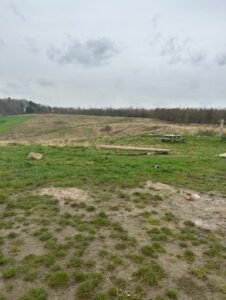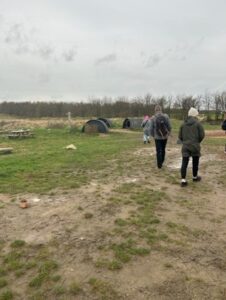Outbound Student Mobility Program
Half a million dollars could take you a long way — and for the next five years, it’s going to take a lot of students all over the world.
In September 2021, RRC Polytech received $500,000 from Employment and Social Development Canada, administered by Colleges and Institutes Canada (CiCan) for the Outbound Student Mobility Program — money designed to provide more Indigenous students, students with disabilities, and students facing financial need the opportunity to study abroad. It started as a virtual exchange, but travel resumed in the fall 2022.
In the space of a few months, the College has hosted a group of Finnish students, sent Nursing and Early Childhood Education (ECE) students to Denmark, and plans to send Transportation students to Finland and Jamaica.
“It’s very expensive to travel abroad — this kind of funding breaks down barriers for students to have that global experience,” said Eddy Lau, Director of International Education. “This is a way to strengthen global competency and equity, diversity, and inclusion. We want our students to learn about different cultures and diversify their knowledge about other ways of doing things.”
In early November, a group of RRC Polytech’s ECE and Nursing students went to Denmark for a week, and by their own accounts, it definitely diversified their knowledge.
“This was my first time overseas — I hadn’t travelled much before this,” said Randi Chase, a second-year Nursing student on the trip. “Their way of living is much different from the way we live: they seem to have a way of thinking that supports society-at-large rather than individuals. It’s like the highest tax rate in the world, but that tax goes to free schooling and you have a guaranteed cost-of-living income after you retire. They think very upstream rather than downstream.”
The culture-shock didn’t only affect her personally — Randi believes it was professionally helpful, too.
“A large thing in nursing is relational practice, so being able to form therapeutic relationships,” said Chase. “Living in another culture and learning to adapt is going to help me do that in my own practice. And the networking — I knew nothing about Early Childhood Education before this trip, and I didn’t realize how similar they are in terms of caring and relational practice — networking with people who are professionals in a different country gave me confidence in my ability to have inter-professional relationships where I’m working.”
Kaylee Leochko, a second-year Early Childhood Educator on the trip, shared similar thoughts. It was also her first time going overseas, and experiencing a new culture and a different way to educate was illuminating.
“The early childhood educators in Denmark are referred to as pedagogs, and how they view childcare, to me, is they believe in fostering independence,” said Leochko. “They really believe in ‘risky play,’ which I noticed really benefited childrens’ gross motor skills. There were children playing on milk crates that had amazing balance compared to children on some of my previous practicums. Seeing it, at first, made me anxious — but they really didn’t need my help. They were all around the age of five.”
She says childcare centres are also physically different from her Canadian experiences: there’s more room to play, both inside and outside, and even the smaller inner-city centres were able to give children more space than we’re used to.

Outdoor space in a rural Danish childcare facility. Photo courtesy of Kaylee Leochko.

Outdoor space in a rural Danish childcare facility. Photo courtesy of Kaylee Leochko.
“It really made me think about how to design a childcare environment,” said Leochko. “I really believe we could make changes to spacing and environment. Also, seeing that children are more independent than we think. Allowing more space for that benefits their confidence, and I believe we need to work on fostering that in Canada.”
As with any exchange, the College hopes to offer similar experience to students from outside Canada: shortly before Nursing and ECE students shipped out to Denmark, RRC Polytech hosted three Finnish transportation students and their instructor. It was their first time in Canada.
“It was a really good experience — students were really kind,” said Karita Raesalmi, who’s training to be a mechanic. “You can learn so many new skills and make contacts in a new country. We’re seeing the world in a different view, working in a different language, and it was always a dream of mine to come to Canada.”
They said their visit was different than home, but somehow familiar.
“It’s hard to pinpoint, but Canada is similar to Finland, but bigger. Maybe it’s the winter, or hockey,” said Ville Hytönen, who’s also training to be a mechanic. “But everyone is so very friendly. There’s no small talk in Finland — or there’s less of it.”
“Halloween was also amazing: it’s not a big thing in Finland,” said Jessika Oxman, who’s training to be an autobody painter. “We carved pumpkins, trick-or-treated, and wore scary makeup.”
Cultural and professional experiences like the ones these students had are exactly why RRC Polytech seeks funding for student travel opportunities. It’s what an exchange program is designed to do.
“We continue to apply for funding and providing access to underrepresented students because it strengthens the College’s global competency goal and students make lifetime connections doing it,” ,” said Lau.
Keep an eye out for more student travel opportunities and more stories from students going places over the coming months.